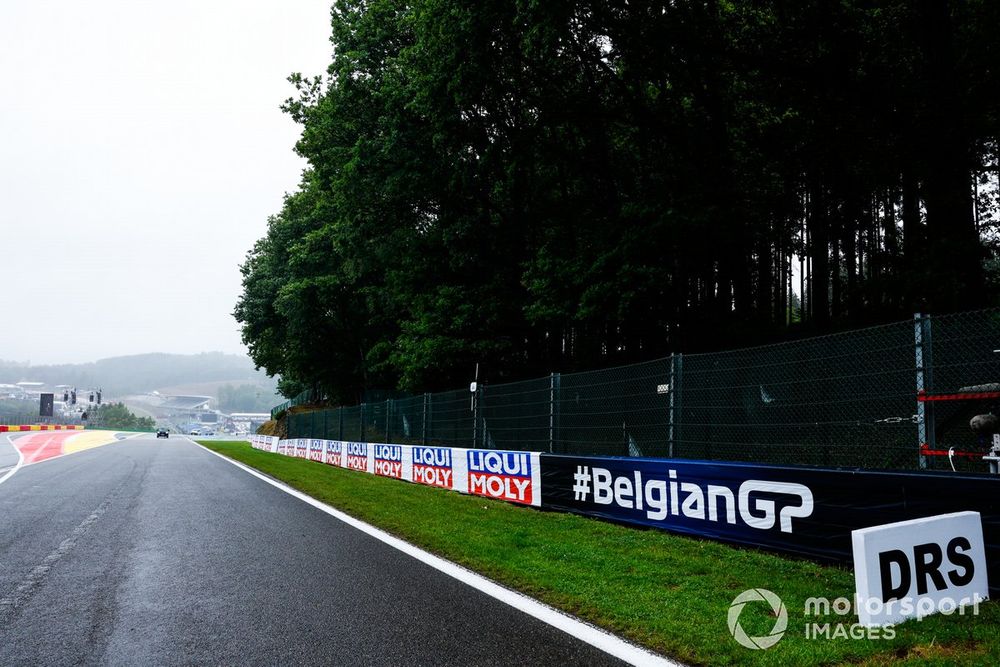
Russell indicated that F1 may see a repeat of the 2021 race day with little or no track running thanks to the conditions amid ongoing concerns over visibility.
Safety in the wet at Spa was brought into sharp focus by the death of Dutch youngster Dilano van 't Hoff in a FRECA race at the venue earlier this month.
After the accident, the Grand Prix Drivers' Association wrote to the FIA asking to be informed of the result of any investigation and enquiring as to what could be done to improve safety at the venue both for F1 and other categories.
"At the moment we're in constant comms with the FIA following the tragic passing of Dilano in FRECA," said Mercedes driver Russell when asked by Motorsport.com about the GPDA's dialogue with the governing body.
"The two questions are, is Spa safe enough? And then it's the question of the conditions, and I think the fact is motorsport will always be dangerous when you're travelling at these speeds.
"If you were to put a ranking of risk of all the circuits for sure, Spa is one of the riskier circuits, along with Jeddah, and along with Monaco, for example, Suzuka to a degree.
"Then when you got the combination of the weather, it's very challenging. It's the visibility, we just have no visibility whatsoever, and the way I describe it to try and give some perspective is driving down the motorway in pouring rain and turning your windscreen wipers off, and that's genuinely how it feels from the cockpit.
"So [there are] not really any short-term solutions. I personally think Spa is safe enough, but it's just we need to find a solution for the wet for visibility."

Russell stressed that the GPDA has not asked for future changes to the layout at Eau Rouge.
"We've spoken about it, and I think between everybody, we concluded that we don't think it needs it," he said. "They've obviously made a lot of progress with the run-off, so that's probably the most important thing."
Russell accepted that on at least some of the three days this weekend's track action could be compromised by the weather.
"I think, fortunately, the weather I think looks better on Sunday," he said. "So I think Sunday will be going ahead. But following recent events I think the FIA have to be bold with their decisions when it comes to safety when it comes to visibility.
"We know what the situation was two years ago. We don't want it to be strung out as perhaps it was then. But as I said, we are going to need some bold decisions.
"We all want to race, everybody wants to race. But when you're going down that straight at over 200 miles an hour, and you can't see 50 metres in front of you, there will be huge incidents. So yeah, they've got a big responsibility this weekend."
Asked if he thought cars could race in the sort of rain seen at Spa during Thursday's media activities he said: "Well, I think two years ago, that was a quick decision to call the race off. I think for one single F1 car to drive around, the conditions are safe enough and suitable enough to drive, but it's when you've got 20 cars on track at once.

"Anybody from third position backwards, cannot see. You're talking 20, 30 or 40 metres. And I felt like the incident that happened in FRECA, it was only really a matter of time that something like that happened.
"Drivers aren't going flat out in the straight because they can't see, somebody gets rear-ended, and then there's a car in the middle of a track.
"So, obviously, to have a race cancelled is not perfect for anybody but we don't want to see another huge incident as it as we've just seen."
Russell stressed that the drivers enjoy a good relationship with the FIA when discussing safety matters.
"To be honest, I think being in this role now for three years or so I think there's definitely more interaction between us collectively as drivers and the FIA," he said.
"And they're definitely wanting to hear our views, put our perspectives forward from the cockpit, not only to try and improve F1, but it's motorsport as a whole. I think that we've all got this incredible technology here and talking about future AI technology that may help solve some of these tragic accidents that happen.
"But equally, it needs to be stuff that can filter down into lower formulas, which don't have all of the technology, the CCTV cameras to make these quick reactions to terrible incidents.
"So yeah, of course, as I said, it's always going to be dangerous, but we just need to keep on work-in-progress."
He added: "The fact is, we're not going to find a solution for poor visibility for probably years to come. It's challenging, it's really not easy.
"And I fear a little bit for the junior categories. I truly think F3 should not be allowed to have 30 cars on track at one time, at any point, even in dry conditions. And again, I feel like it's a matter of time before a big incident happens there too."







